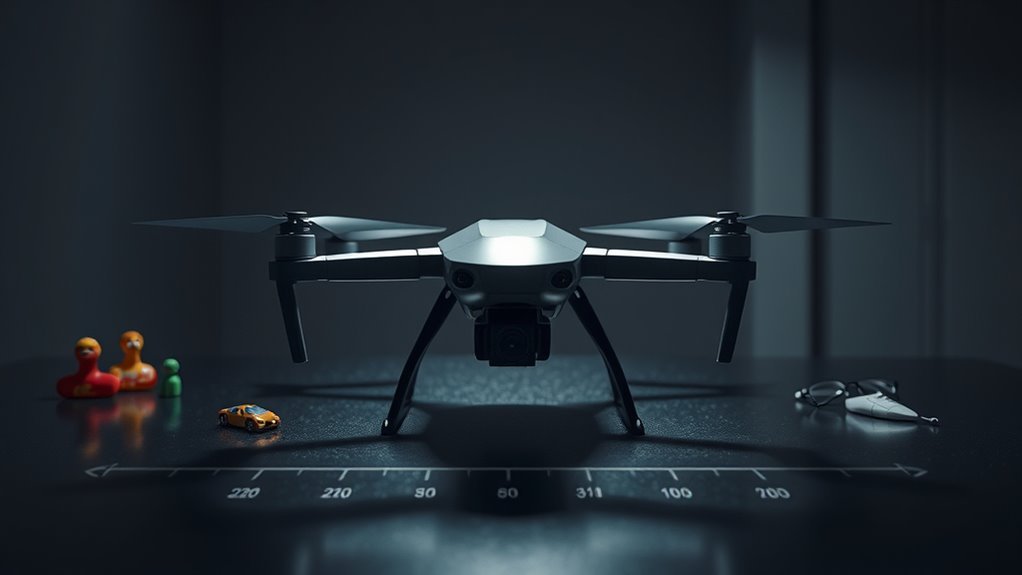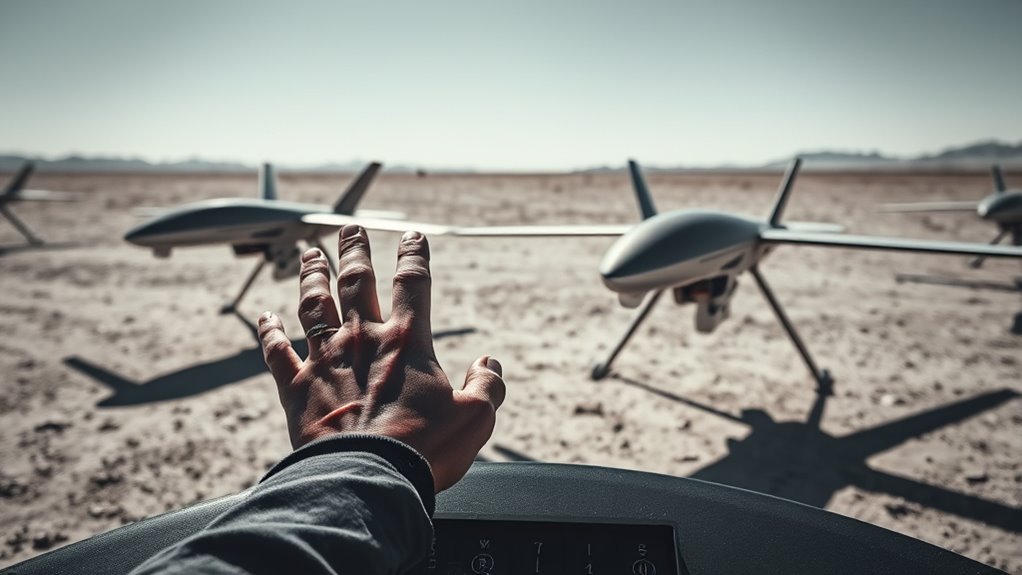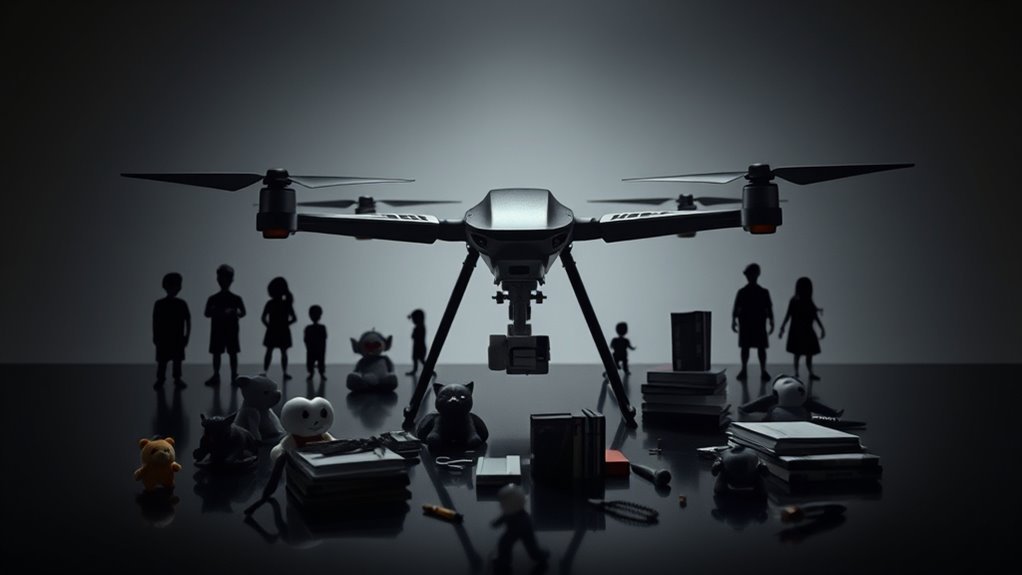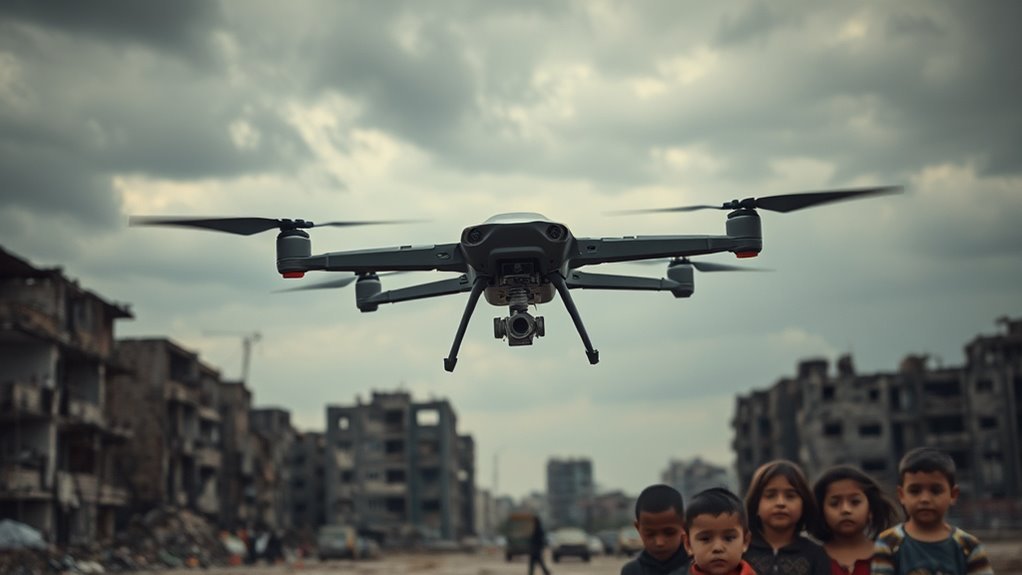Determining the right age for operating drones, particularly in military contexts, involves analyzing cognitive maturity and emotional understanding. Younger individuals may lack the moral responsibility needed for high-stakes decisions. Decision-making abilities improve with age, but emotional regulation also plays a vital role. Legal frameworks often do not align with developmental psychology, leading to gaps in accountability. Understanding these layers is essential for making informed choices about drone deployment. You’ll uncover more insights on this complex issue soon.
The Evolution of Drone Technology

As drone technology has advanced over the years, it’s clear that these devices have evolved from simple remote-controlled toys into sophisticated machines capable of complex tasks. The rapid drone advancements have led to significant technological implications across various sectors, including agriculture, surveillance, and logistics. You’ve likely seen how drones can now perform precision agriculture, optimizing crop yields while minimizing resource use. Additionally, their use in automated crop monitoring demonstrates how they can reduce labor expenses while enhancing overall productivity. In addition, their role in delivering goods has the potential to reshape supply chains, making them more efficient. Moreover, the introduction of AI-enhanced flight capabilities allows for smarter navigation and decision-making, further enhancing their utility. However, with these advancements come responsibilities. Understanding the full extent of how drones can be deployed, and the societal impacts of their use, is vital for fostering a future where freedom and innovation coexist harmoniously. Consider how these implications might affect your own life.
Ethical Considerations in Military Engagement

As you consider the ethical implications of deploying murder drones in military operations, several critical issues arise. Autonomous decision-making raises concerns about accountability in the event of civilian casualties, while compliance with international law becomes increasingly complex. Each of these factors necessitates careful evaluation to guarantee responsible use of such technology in warfare.
Autonomous Decision-Making Dilemmas
While the advancement of autonomous drones in military operations promises enhanced efficiency and precision, it also raises significant ethical dilemmas regarding decision-making in combat scenarios. You must consider how decision-making algorithms affect outcomes and the implications of relinquishing human judgment.
- Autonomous ethics: How do we define moral responsibility when machines make life-and-death choices?
- Accountability: Who’s responsible if an autonomous drone makes a grave error?
- Human oversight: Should there be limits on autonomy to guarantee human intervention remains integral?
These questions highlight the complexities of integrating advanced technology into warfare. As you explore these dilemmas, it’s vital to weigh the potential benefits against the ethical ramifications of delegating critical decisions to machines.
Civilian Casualties and Accountability
The integration of autonomous drones in military operations raises profound ethical concerns, particularly regarding civilian casualties. You must consider the potential civilian impacts, as these drones can operate with alarming precision yet still miss their intended targets. The challenge arises in ensuring accountability measures are in place to address this tragic reality. When autonomous systems make decisions, the question of who’s responsible for collateral damage becomes critical. Are military leaders, manufacturers, or programmers liable? Without clear accountability, the ethical fabric of military engagement frays, potentially leading to a disregard for civilian life. As you evaluate the deployment of these technologies, it’s essential to weigh the balance between military efficiency and the moral obligation to protect innocent lives.
International Law Compliance Issues
When evaluating the deployment of autonomous drones in military operations, one must grapple with the complexities of international law compliance. As drone proliferation increases, ensuring adherence to international treaties becomes critical. You should consider:
- The legality of targeted strikes under existing frameworks, like the Geneva Conventions.
- The implications of state sovereignty and the potential for conflicts arising from unauthorized drone use.
- The ethical ramifications of using autonomous systems that may lack human judgment in critical situations.
These factors highlight the tension between technological advancement and legal norms. Balancing military effectiveness with compliance is essential to uphold global standards and protect human rights. Understanding these complexities will help navigate the challenges posed by autonomous weaponry in modern warfare.
Psychological Readiness of Operators

Understanding psychological readiness is crucial for operators of murder drones, as their decisions can have profound consequences. Mental resilience is a key component of this readiness, enabling operators to withstand stress and maintain focus during critical missions. Effective operator training should emphasize the development of this resilience, incorporating scenarios that challenge emotional and cognitive capacities. By simulating high-pressure situations, training programs can better prepare individuals to handle the gravity of their actions. Additionally, fostering an environment that encourages open discussion about psychological challenges can enhance overall well-being. Ultimately, ensuring that operators possess the necessary mental fortitude is imperative for responsible drone operation, as it directly influences their judgment and decision-making in life-or-death situations.
Legal Frameworks Governing Drone Use
While various legal frameworks exist to govern the use of drones, their application often varies considerably across jurisdictions. This inconsistency raises significant legal implications for operators and manufacturers alike. Understanding the drone regulations in your area is essential. Here are some key factors to take into account:
- Licensing Requirements: Different regions may require specific licenses for drone operation, impacting accessibility.
- Privacy Laws: Drones can infringe on personal privacy, leading to legal challenges if regulations aren’t followed.
- Liability Issues: Operators may face legal repercussions for accidents, emphasizing the importance of understanding local laws.
The Impact of Age on Decision-Making
When considering the appropriate age for operating murder drones, it’s essential to assess how cognitive development stages affect decision-making abilities. Emotional maturity plays a significant role as well, influencing an individual’s capacity to handle high-stakes situations. Additionally, legal age considerations must align with these developmental factors to guarantee responsible use.
Cognitive Development Stages
Cognitive development stages play an essential role in shaping decision-making abilities, as various age groups exhibit distinct ways of processing information and evaluating consequences. Understanding these stages helps clarify why certain age groups may not be suitable for complex decisions, such as those involving murder drones.
- Cognitive milestones: Young children often struggle with abstract thinking, influencing their choices.
- Adolescent reasoning: Teenagers may exhibit more risk-taking behaviors, as their brains are still maturing.
- Mature cognition: Adults generally demonstrate better judgment, having acquired more experience and knowledge over time.
Recognizing these differences can inform policies regarding age restrictions for operating advanced technologies, ensuring that individuals are developmentally prepared to make responsible decisions.
Emotional Maturity Factors
Emotional maturity greatly influences decision-making, particularly in high-stakes scenarios like operating murder drones. When evaluating whether an individual possesses the necessary emotional intelligence, a maturity assessment becomes significant. This evaluation can reveal how well someone understands their emotions and the emotions of others, which is important in the context of drone operations where ethical considerations abound. Younger individuals may lack the emotional depth to grapple effectively with the moral implications of their actions. In contrast, those with higher emotional maturity tend to navigate complex decisions more adeptly, weighing not just tactical outcomes but also the human consequences. As a result, understanding the intersection of age and emotional maturity is essential for ensuring responsible decision-making in such critical roles.
Legal Age Considerations
Although age is often seen as a straightforward metric for maturity, its implications on decision-making, especially in high-stakes environments like operating murder drones, are far more complex. Establishing a legal age for such responsibilities involves examining several factors:
- Cognitive development: Younger individuals may lack the ability to fully understand consequences.
- Moral responsibility: Age doesn’t guarantee an understanding of ethical implications associated with using deadly technology.
- Emotional regulation: Decision-making under pressure can vary greatly with age, impacting effectiveness.
Ultimately, determining the legal age for operating murder drones requires a nuanced evaluation of these elements. It’s not just about reaching a number; you need to reflect on the depth of moral responsibility that comes with such power.
Public Perception and Societal Implications
How do people really feel about the potential use of murder drones in society? Public trust is a significant factor; many fear that using drones for lethal purposes could undermine societal norms rooted in human rights and ethical considerations. Concerns arise about the potential for abuse, privacy violations, and the erosion of accountability. You might wonder how society can maintain a moral compass when technology blurs the lines of right and wrong. The perception of murder drones as a tool for justice or oppression heavily influences public sentiment. As you consider these implications, it is crucial to recognize that the acceptance of such technology hinges on transparent governance, safeguarding individual freedoms, and fostering a culture of responsibility in its deployment.
Frequently Asked Questions
What Are the Physical Requirements for Operating Murder Drones?
To operate advanced drones, you’ll need strong technical proficiency and a commitment to operational safety. Understanding complex controls and regulations is essential, ensuring you can effectively manage and navigate these sophisticated machines in various environments.
How Does Training Duration Vary by Age Group?
Training duration varies by age group due to differing adaptability. Younger individuals often grasp training techniques quickly, while older groups may require more time to adjust. Tailoring approaches guarantees effective learning across all ages.
Are There Specific Health Considerations for Older Operators?
When considering older operators, you should account for cognitive decline and physical limitations. These factors can impact decision-making and operational efficiency, necessitating tailored training and support to guarantee effectiveness and safety in their roles.
What Is the Impact of Age on Drone Technology Comprehension?
As you navigate the landscape of drone technology, age can shape cognitive development and technological literacy. Younger individuals often adapt faster, while older operators may possess deeper analytical skills, balancing experience with modern tech challenges.
How Does Public Opinion Differ by Age Regarding Murder Drones?
Public opinion on murder drones varies considerably by age, with younger generations often holding more progressive ethical perspectives. In contrast, older groups may emphasize traditional generational attitudes, reflecting deeper concerns about morality and accountability in warfare.

